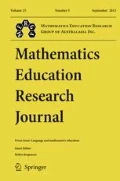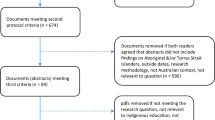Abstract
In mathematics education, there are (at least) two seemingly disparate and unethical issues that have been allowed to continue unresolved for decades: the math wars (traditional versus reform teaching and learning of mathematics) and the marginalisation of Indigenous students within K-12 mathematics. Willie Ermine, an Indigenous scholar, has proposed the use of ethical spaces to explore and analyse occurrences of unethical situations arising between the “intersection of Indigenous law and Canadian Legal systems” (Ermine, Indigenous Law Journal 6(1):193–203, 2007). This paper brings Ermine’s notion of ethical spaces to the field of mathematics education research as the theoretical framework for analysing the aforementioned issues. The result of this analysis is a potential single theoretical resolution to both dilemmas that can also serve as a significant factor in the processes of decolonisation.
Similar content being viewed by others
References
Absolon, K. (2010). Indigenous wholistic theory: a knowledge set for practice. First Peoples Child & Family Review, 5(2), 74–87.
Absolon, K., & Willett, C. (2005). Putting ourselves forward: Location in Aboriginal research. In L. Brown & S. Strega (Eds.), Research as resistance: Critical, Indigenous, & anti-oppressive approaches. Toronto: Canadian Scholars’ Press.
Aitken, N. E., & Bruised Head, A. (2008). Native reserve students’ and native public school students’ ways of knowing math. The Canadian Journal of Native Studies, XXVIII, 2, 295–312.
Barnhardt, R., & Kawagly, A. O. (2005). Indigenous knowledge systems and Alaska Native ways of knowing. Anthropology and Education Quarterly, 36(1), 8–23.
Barton, B. (2009). The language of mathematics: Telling mathematical tales. New York: Springer.
Barton, B., Fairhall, U., & Trinick, T. (1998). Tikanga Reo Tātai: issues in the development of a Mäori mathematics register. For the Learning of Mathematics, 18(1), 3–9.
Becker, J. P, & Jacob, B. (1998). Math war developments in the United States (California), ICMI Bulletin No. 44. Retrieved from: http://lsc-net.terc.edu/do/paper/8090/show.1.html.
Canadian Council on Learning (2007). Redefining how success is measures in First Nations, Inuit and Métis Learning. Retried from: http://www.ccl-cca.ca/pdfs/RedefiningSuccess/Redefining_How_Success_Is_Measured_EN.pdf.
CBCNEWS (2007). Math curriculum changes don’t add up: Experts. Retired from http://www.cbc.ca/news/canada/newfoundland-labrador/story/2007/04/05/math-changes.html.
Cheek, H. N. (1984). A suggested research map for Native American mathematics education. Journal of American Indian Education, 23(2), 1–9.
Davison, D. M., & Mitchell, J. E. (2008). How is mathematics education philosophy reflected in the math wars? The Montana Mathematics Enthusiast, 5(1), 143–154.
Ermine, W. (1995). Aboriginal epistemology. In M. Battiste & J. Barman (Eds.), First Nations education in Canada: The circle unfolds (pp. 101–112). Vancouver: UBC Press.
Ermine, W. (2007). The ethical space of engagement. Indigenous Law Journal, 6(1), 193–203.
Ermine, W. (2011). Willie Ermine: Ethical space in action [Video file]. Retrieved from http://www.youtube.com/watch?v=ZUfXu3gfVJ8.
Graham, B. (1988). Mathematical education and Aboriginal children. Educational Studies in Mathematics, 19(2), 119–135.
Greer, B., Mukhopadhyay, S., Powell, A. B., & Nelson-Barber, S. (2009). Culturally responsive mathematics education. New York: Routledge.
Hogan, L. (2000). A different yield. In M. Battiste (Ed.), Reclaiming Indigenous voice and vision (pp. 115–123). Vancouver: UBC Press.
Howard, P., & Perry, B. (2005). Learning mathematics: perspectives of Australian Aboriginal children and their teachers. In H.L. Chick & J. L. Vincent (Eds), Proceedings of the 29th Conference of the International Group for the Psychology of Mathematics Education, Vol. III, pp. 153–160. University of Melbourne: Psychology of Mathematics Education.
Howden, C. (Host). (2012). Between two worlds (Radio Episode). In Living out loud. Canadian Broadcasting Corporation.
Johnson, H. (2007). Two families: Treaties and government. Saskatoon: Purich Publishing Limited.
Kovach, M. (2009). Indigenous methodologies: Characteristics, conversations, and contexts. Toronto: University of Toronto Press.
Leavitt, R. (1995). Language and cultural content in Native education. In M. Battiste & J. Barman (Eds.), First Nations education in Canada: The circle unfolds (pp. 124–138). Vancouver: UBC Press.
Little Bear, L. (2000). Jagged worldviews colliding. In M. Battiste (Ed.), Reclaiming Indigenous voice and vision (pp. 77–85). Vancouver: UBC Press.
Loewenberg Ball, D., Ferrini-Mundy, J., Kilpatrick, J., Milgram, R. J, Schmid, W., & Scharr, R. (2005). Reaching for common ground in K-12 mathematics education. Notices of the AMS. Retrieved from: http://www.ams.org/notices/200509/comm-schmid.pdf.
Lunney Borden, L., & Wagner, D. (2007). ‘Show me your math’: Inviting children to do ethnomathematics. Proceedings of the 29th annual meeting of the North American Chapter of the International Group for the Psychology of Mathematics Education, Lake Tahoe, USA, October, 2007.
Mather, J. R. C. (1997). How do American Indian fifth and sixth graders perceive mathematics and the mathematics classroom? Journal of American Indian Education, 36(2), 9–18.
Meyer, M. A. (2003). Ho’oulu: Our time of Becoming. Honolulu: ‘Ai Pōhake Press.
Murphy, R. (2012). Is there something wrong with the way math is taught in Canadian schools? In Cross country check-up. Canadian Broadcasting Corporation.
NCTM. (1989). Principles and standards for school mathematics. Reston: NCTM.
Neel, K., & Fettes, M. (2010). Teaching numeracy in a community context: The roles of culture and imagination. Vinculum, 2(2), 45–63.
O’Brien, T. C. (1999). Parrot Math. The Phi Delta Kappan, 80(6), 434–438.
Powell, A. B., & Frankenstein, M. (1997). Ethnomathematics: Challenging Eurocentrism in mathematics education. New York: State University of New York Press.
Restivo, S., & Sloan, D. (2007). The sturm und drang of mathematics: Casualties, consequences, and contingencies in the math wars. Philosophy of Mathematics Education Journal, 20. Retrieved from: http://people.exeter.ac.uk/PErnest/pome20/.
Reys, R. E. (2001). Curricular controversy in the math wars: a battle without winners. Phi Delta Kappan, 83(3), 255–258.
Saskatchewan Ministry of Education (2008). Saskatchewan education indicators report: Pre-kindergarten to grade 12. Regina, SK: Saskatchewan Ministry of Education. Retrieved from: http://www.education.gov.sk.ca/Default.aspx?DN=69222f44-c385-49d7-aff4-9dc770f47750.
Saskatchewan Ministry of Education (2009). Saskatchewan education indicators report: Pre-kindergarten to grade 12. Regina, SK: Saskatchewan Ministry of Education. Retrieved from: http://www.education.gov.sk.ca/Default.aspx?DN=dfaff52e-a0f2-485e-9213-daaa59424ffe.
Saskatchewan Ministry of Education (2010). Saskatchewan education indicators report: Pre-kindergarten to grade 12. Regina, SK: Saskatchewan Ministry of Education. Retrieved from: http://www.education.gov.sk.ca/2010-Indicators.
Schelbert, L. (2003). Pathways of human understanding: An inquiry into Western and North American Indian worldview structures. American Indian Culture and Research Journal, 27(1), 61–75.
Schoen, H. L., Fey, J. T., Hirsch, C. R., & Coxford, A. F. (1999). Issues and options in the math wars. Phi Delta Kappan, 80(6), 444–453.
Schoenfeld, A. H. (2004). The math wars. Educational Policy, 18(1), 253–286.
Scott, P. B. (1983). Mathematics achievement test scores of American Indian and Anglo students: a comparison. Journal of American Indian Education, 22(3), 17–19.
Smith, G. H. (2000). Protecting and respecting indigenous knowledge. In M. Battiste (Ed.), Reclaiming Indigenous voice and vision (pp. 209–221). Vancouver: UBC Press.
Stemhagen, K. (2007). Empiricism, contingency and evolutionary metaphors: getting beyond the math wars. International Electronic Journal of Mathematics Education, 2(2), 91–105.
Sternberg, G., & McDonnell, T. (2010). Indigenous, personal and western mathematics: Learning from place. vinculum: Journal of the Saskatchewan Mathematics Teachers’ Society, 2(2), 10–22.
Trent, J. H., & Gilman, R. A. (1985). Math achievement of Native Americans in Nevada. Journal of American Indian Education, 24(1), 39–45.
U.S. Commission on Civil Rights (2003). A quiet crisis: Federal funding and unmet needs in Indian country. Retrieved from: http://www.usccr.gov/pubs/na0703/na0204.pdf.
Wallis, C. (2006). How to end the math wars. Time, 168(2). Retrieved from: http://www.time.com/time/magazine/article/0,9171,1561144,00.html.
Youngblood Henderson, J. (2000). Postcolonial ghost dancing: diagnosing European colonialism. In M. Battiste (Ed.), Reclaiming Indigenous voice and vision (pp. 57–76). Vancouver: UBC Press.
Acknowledgments
We acknowledge that, although we present these ideas for the first time in written (academic) form, there are yet unrecognised giants whose shoulders have afforded us this opportunity: the ancestors of the Indigenous peoples, who over the millennia have created, refined, and shared openly their Indigenous worldviews, despite the many campaigns to eliminate those beliefs, and all too often, even the people. We further acknowledge that our written knowledge has benefitted from the oral traditions of the Indigenous people and in doing so we seek to give back by both celebrating their knowledge and by attempting to resolve problems within mathematics teaching and learning, many of which have and continue to negatively impact the world’s Indigenous peoples. It is important that this acknowledgement be given, so that we do not consider this knowledge part of a “huge supermarket in which knowledge can be packaged up to be bought and sold…[without considering] the intellectual cultural property rights” (Smith 2000, p. 218) of Indigenous peoples.
Author information
Authors and Affiliations
Corresponding author
Rights and permissions
About this article
Cite this article
Russell, G.L., Chernoff, E.J. The marginalisation of Indigenous students within school mathematics and the math wars: seeking resolutions within ethical spaces. Math Ed Res J 25, 109–127 (2013). https://doi.org/10.1007/s13394-012-0064-1
Received:
Revised:
Accepted:
Published:
Issue Date:
DOI: https://doi.org/10.1007/s13394-012-0064-1




